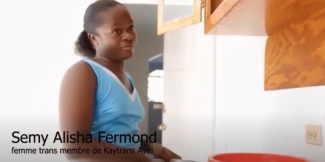Much of the feminist movement in Haiti thinks the crisis-torn country isn’t ready for this conversation – but it will make us all better feminists

Trans people in Haiti ask for respect and safety in a recent campaign by Transgender Haiti.
Feminism should be inclusive. But in Haiti, where we live, it often isn’t. Haitian trans women, in particular, face multiple threats daily from Haiti’s patriarchal society, Lulu, an activist and spokesperson for Kay Trans, a refuge for trans people in Port-au-Prince, Haiti’s capital, told us.
Haitian women’s groups are mobilising to confront patriarchal systems, to organise feminist movements in the country, to fight for change. It is a sad fact, however, that some voices are left out or sometimes even hatefully or shamefully silenced, excluding them from claiming their rights and participating within these movements and within society.
“Trans NGOs have never been invited to any organised [feminist] activity. The services and information on GBV [gender-based violence] that are offered have no definition, vocabulary or clear interest in women like me,” Semi, a trans activist from the town of Petit-Goave in southern Haiti, told us.
Trans people, Semi added, “face abominable circumstances to survive. It is difficult for us to get access to health services, while getting access to hormones or psycho-social support is a luxury [...] and there are no platforms to raise our voices or work on improving the systems in place.”
A significant part of the feminist movement in Haiti thinks that the country isn’t ready for this conversation – that there are too many other problems to deal with, and now is not the time to include trans voices in debates. The subject is too complex, too difficult to work on, too sensitive to speak about.
But this suggests that trans women have to stop existing and stop being themselves in their struggle for space, dignity, respect and protection. This is unacceptable. Feminism is about equality – for all.
Crisis and struggle
Haiti has made headlines globally for its current political and economic crisis – one of its worst since 1986, when the father-and-son dictatorships of François and Jean-Claude Duvalier ended, after 29 years.
This crisis exacerbates the vulnerability of already marginalised communities. Sexual harassment and gender-based violence are criminalised, but still too common.
Also, LGBT people have little legal protection. They suffer considerable discrimination, and anti-LGBT movements are more active and vocal than ever. Politicians have also tried to pass new anti-LGBT bills (so far without success).
Changing this will be hard, but we must struggle for true equality, inclusive of diversity: of sex, sexuality, gender, economic realities, colour and race.
We must challenge the idea that trans and other gender identities are less legitimate than their cis counterparts.
We must be intentionally inclusive to ensure that every human being is respected, and justice is served when their rights are violated.
Failing to do this betrays the essence of feminism, a movement that is defined by its radical defence of equal human rights. And we must pay particular attention to women who are most at risk of being discriminated against, being beaten, raped, murdered and ignored by patriarchal systems.
An inclusive approach to feminism – which defends trans women – makes us all better feminists.
